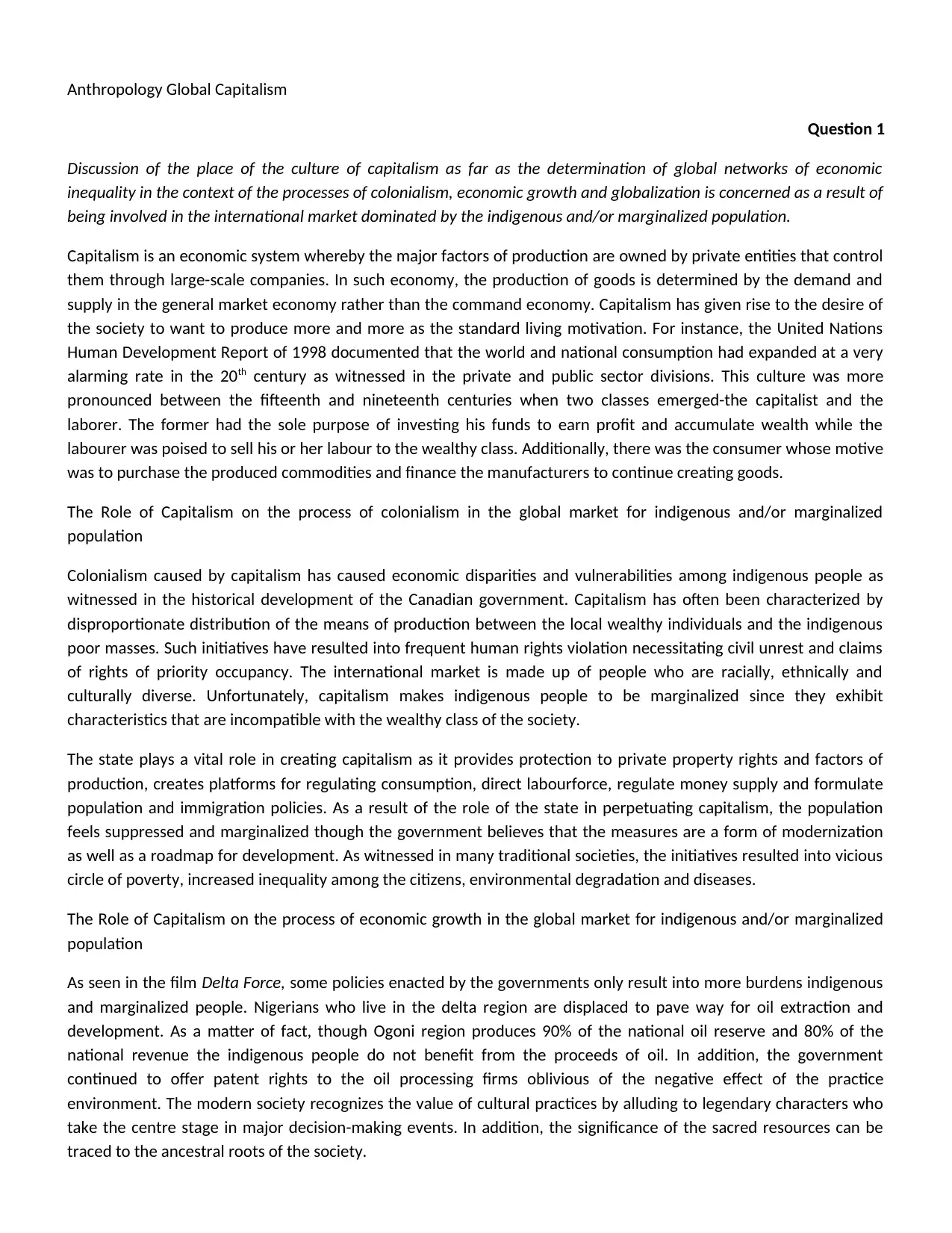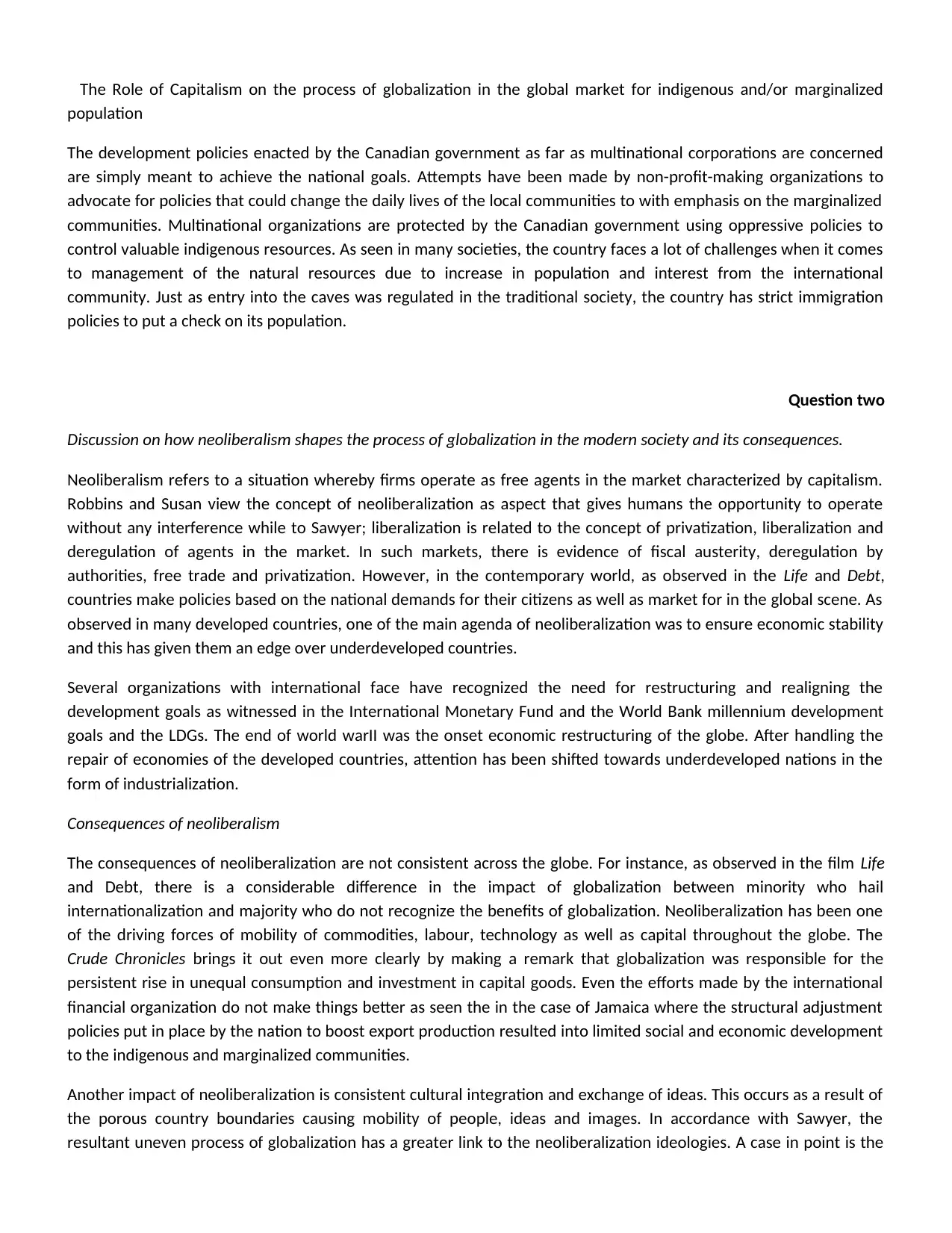Anthropology Essay: Global Capitalism, Colonialism, and Inequality
VerifiedAdded on 2022/09/16
|3
|1269
|18
Essay
AI Summary
This essay delves into the intricate relationship between global capitalism, colonialism, neoliberalism, and the marginalization of indigenous populations. It examines how capitalist structures, driven by private ownership and market forces, have shaped global networks of economic inequality. The essay explores the role of colonialism in creating economic disparities, the impact of economic growth on indigenous communities, and the consequences of globalization. It analyzes the role of the nation-state in perpetuating capitalist culture, and the conflicts arising between indigenous cultures and the homogenizing goals of the state. Furthermore, the essay discusses the influence of neoliberalism on globalization, including its effects on commodity flows, labor, technology, and capital. The analysis considers the consequences of neoliberal policies, such as cultural integration, and the uneven distribution of benefits and drawbacks. The essay draws on examples from various regions, including Canada and Jamaica, to illustrate the impacts of these processes on indigenous and marginalized groups, highlighting issues such as resource control, human rights violations, and the struggle for cultural preservation.

Anthropology Global Capitalism
Question 1
Discussion of the place of the culture of capitalism as far as the determination of global networks of economic
inequality in the context of the processes of colonialism, economic growth and globalization is concerned as a result of
being involved in the international market dominated by the indigenous and/or marginalized population.
Capitalism is an economic system whereby the major factors of production are owned by private entities that control
them through large-scale companies. In such economy, the production of goods is determined by the demand and
supply in the general market economy rather than the command economy. Capitalism has given rise to the desire of
the society to want to produce more and more as the standard living motivation. For instance, the United Nations
Human Development Report of 1998 documented that the world and national consumption had expanded at a very
alarming rate in the 20th century as witnessed in the private and public sector divisions. This culture was more
pronounced between the fifteenth and nineteenth centuries when two classes emerged-the capitalist and the
laborer. The former had the sole purpose of investing his funds to earn profit and accumulate wealth while the
labourer was poised to sell his or her labour to the wealthy class. Additionally, there was the consumer whose motive
was to purchase the produced commodities and finance the manufacturers to continue creating goods.
The Role of Capitalism on the process of colonialism in the global market for indigenous and/or marginalized
population
Colonialism caused by capitalism has caused economic disparities and vulnerabilities among indigenous people as
witnessed in the historical development of the Canadian government. Capitalism has often been characterized by
disproportionate distribution of the means of production between the local wealthy individuals and the indigenous
poor masses. Such initiatives have resulted into frequent human rights violation necessitating civil unrest and claims
of rights of priority occupancy. The international market is made up of people who are racially, ethnically and
culturally diverse. Unfortunately, capitalism makes indigenous people to be marginalized since they exhibit
characteristics that are incompatible with the wealthy class of the society.
The state plays a vital role in creating capitalism as it provides protection to private property rights and factors of
production, creates platforms for regulating consumption, direct labourforce, regulate money supply and formulate
population and immigration policies. As a result of the role of the state in perpetuating capitalism, the population
feels suppressed and marginalized though the government believes that the measures are a form of modernization
as well as a roadmap for development. As witnessed in many traditional societies, the initiatives resulted into vicious
circle of poverty, increased inequality among the citizens, environmental degradation and diseases.
The Role of Capitalism on the process of economic growth in the global market for indigenous and/or marginalized
population
As seen in the film Delta Force, some policies enacted by the governments only result into more burdens indigenous
and marginalized people. Nigerians who live in the delta region are displaced to pave way for oil extraction and
development. As a matter of fact, though Ogoni region produces 90% of the national oil reserve and 80% of the
national revenue the indigenous people do not benefit from the proceeds of oil. In addition, the government
continued to offer patent rights to the oil processing firms oblivious of the negative effect of the practice
environment. The modern society recognizes the value of cultural practices by alluding to legendary characters who
take the centre stage in major decision-making events. In addition, the significance of the sacred resources can be
traced to the ancestral roots of the society.
Question 1
Discussion of the place of the culture of capitalism as far as the determination of global networks of economic
inequality in the context of the processes of colonialism, economic growth and globalization is concerned as a result of
being involved in the international market dominated by the indigenous and/or marginalized population.
Capitalism is an economic system whereby the major factors of production are owned by private entities that control
them through large-scale companies. In such economy, the production of goods is determined by the demand and
supply in the general market economy rather than the command economy. Capitalism has given rise to the desire of
the society to want to produce more and more as the standard living motivation. For instance, the United Nations
Human Development Report of 1998 documented that the world and national consumption had expanded at a very
alarming rate in the 20th century as witnessed in the private and public sector divisions. This culture was more
pronounced between the fifteenth and nineteenth centuries when two classes emerged-the capitalist and the
laborer. The former had the sole purpose of investing his funds to earn profit and accumulate wealth while the
labourer was poised to sell his or her labour to the wealthy class. Additionally, there was the consumer whose motive
was to purchase the produced commodities and finance the manufacturers to continue creating goods.
The Role of Capitalism on the process of colonialism in the global market for indigenous and/or marginalized
population
Colonialism caused by capitalism has caused economic disparities and vulnerabilities among indigenous people as
witnessed in the historical development of the Canadian government. Capitalism has often been characterized by
disproportionate distribution of the means of production between the local wealthy individuals and the indigenous
poor masses. Such initiatives have resulted into frequent human rights violation necessitating civil unrest and claims
of rights of priority occupancy. The international market is made up of people who are racially, ethnically and
culturally diverse. Unfortunately, capitalism makes indigenous people to be marginalized since they exhibit
characteristics that are incompatible with the wealthy class of the society.
The state plays a vital role in creating capitalism as it provides protection to private property rights and factors of
production, creates platforms for regulating consumption, direct labourforce, regulate money supply and formulate
population and immigration policies. As a result of the role of the state in perpetuating capitalism, the population
feels suppressed and marginalized though the government believes that the measures are a form of modernization
as well as a roadmap for development. As witnessed in many traditional societies, the initiatives resulted into vicious
circle of poverty, increased inequality among the citizens, environmental degradation and diseases.
The Role of Capitalism on the process of economic growth in the global market for indigenous and/or marginalized
population
As seen in the film Delta Force, some policies enacted by the governments only result into more burdens indigenous
and marginalized people. Nigerians who live in the delta region are displaced to pave way for oil extraction and
development. As a matter of fact, though Ogoni region produces 90% of the national oil reserve and 80% of the
national revenue the indigenous people do not benefit from the proceeds of oil. In addition, the government
continued to offer patent rights to the oil processing firms oblivious of the negative effect of the practice
environment. The modern society recognizes the value of cultural practices by alluding to legendary characters who
take the centre stage in major decision-making events. In addition, the significance of the sacred resources can be
traced to the ancestral roots of the society.
Paraphrase This Document
Need a fresh take? Get an instant paraphrase of this document with our AI Paraphraser

The Role of Capitalism on the process of globalization in the global market for indigenous and/or marginalized
population
The development policies enacted by the Canadian government as far as multinational corporations are concerned
are simply meant to achieve the national goals. Attempts have been made by non-profit-making organizations to
advocate for policies that could change the daily lives of the local communities to with emphasis on the marginalized
communities. Multinational organizations are protected by the Canadian government using oppressive policies to
control valuable indigenous resources. As seen in many societies, the country faces a lot of challenges when it comes
to management of the natural resources due to increase in population and interest from the international
community. Just as entry into the caves was regulated in the traditional society, the country has strict immigration
policies to put a check on its population.
Question two
Discussion on how neoliberalism shapes the process of globalization in the modern society and its consequences.
Neoliberalism refers to a situation whereby firms operate as free agents in the market characterized by capitalism.
Robbins and Susan view the concept of neoliberalization as aspect that gives humans the opportunity to operate
without any interference while to Sawyer; liberalization is related to the concept of privatization, liberalization and
deregulation of agents in the market. In such markets, there is evidence of fiscal austerity, deregulation by
authorities, free trade and privatization. However, in the contemporary world, as observed in the Life and Debt,
countries make policies based on the national demands for their citizens as well as market for in the global scene. As
observed in many developed countries, one of the main agenda of neoliberalization was to ensure economic stability
and this has given them an edge over underdeveloped countries.
Several organizations with international face have recognized the need for restructuring and realigning the
development goals as witnessed in the International Monetary Fund and the World Bank millennium development
goals and the LDGs. The end of world warII was the onset economic restructuring of the globe. After handling the
repair of economies of the developed countries, attention has been shifted towards underdeveloped nations in the
form of industrialization.
Consequences of neoliberalism
The consequences of neoliberalization are not consistent across the globe. For instance, as observed in the film Life
and Debt, there is a considerable difference in the impact of globalization between minority who hail
internationalization and majority who do not recognize the benefits of globalization. Neoliberalization has been one
of the driving forces of mobility of commodities, labour, technology as well as capital throughout the globe. The
Crude Chronicles brings it out even more clearly by making a remark that globalization was responsible for the
persistent rise in unequal consumption and investment in capital goods. Even the efforts made by the international
financial organization do not make things better as seen the in the case of Jamaica where the structural adjustment
policies put in place by the nation to boost export production resulted into limited social and economic development
to the indigenous and marginalized communities.
Another impact of neoliberalization is consistent cultural integration and exchange of ideas. This occurs as a result of
the porous country boundaries causing mobility of people, ideas and images. In accordance with Sawyer, the
resultant uneven process of globalization has a greater link to the neoliberalization ideologies. A case in point is the
population
The development policies enacted by the Canadian government as far as multinational corporations are concerned
are simply meant to achieve the national goals. Attempts have been made by non-profit-making organizations to
advocate for policies that could change the daily lives of the local communities to with emphasis on the marginalized
communities. Multinational organizations are protected by the Canadian government using oppressive policies to
control valuable indigenous resources. As seen in many societies, the country faces a lot of challenges when it comes
to management of the natural resources due to increase in population and interest from the international
community. Just as entry into the caves was regulated in the traditional society, the country has strict immigration
policies to put a check on its population.
Question two
Discussion on how neoliberalism shapes the process of globalization in the modern society and its consequences.
Neoliberalism refers to a situation whereby firms operate as free agents in the market characterized by capitalism.
Robbins and Susan view the concept of neoliberalization as aspect that gives humans the opportunity to operate
without any interference while to Sawyer; liberalization is related to the concept of privatization, liberalization and
deregulation of agents in the market. In such markets, there is evidence of fiscal austerity, deregulation by
authorities, free trade and privatization. However, in the contemporary world, as observed in the Life and Debt,
countries make policies based on the national demands for their citizens as well as market for in the global scene. As
observed in many developed countries, one of the main agenda of neoliberalization was to ensure economic stability
and this has given them an edge over underdeveloped countries.
Several organizations with international face have recognized the need for restructuring and realigning the
development goals as witnessed in the International Monetary Fund and the World Bank millennium development
goals and the LDGs. The end of world warII was the onset economic restructuring of the globe. After handling the
repair of economies of the developed countries, attention has been shifted towards underdeveloped nations in the
form of industrialization.
Consequences of neoliberalism
The consequences of neoliberalization are not consistent across the globe. For instance, as observed in the film Life
and Debt, there is a considerable difference in the impact of globalization between minority who hail
internationalization and majority who do not recognize the benefits of globalization. Neoliberalization has been one
of the driving forces of mobility of commodities, labour, technology as well as capital throughout the globe. The
Crude Chronicles brings it out even more clearly by making a remark that globalization was responsible for the
persistent rise in unequal consumption and investment in capital goods. Even the efforts made by the international
financial organization do not make things better as seen the in the case of Jamaica where the structural adjustment
policies put in place by the nation to boost export production resulted into limited social and economic development
to the indigenous and marginalized communities.
Another impact of neoliberalization is consistent cultural integration and exchange of ideas. This occurs as a result of
the porous country boundaries causing mobility of people, ideas and images. In accordance with Sawyer, the
resultant uneven process of globalization has a greater link to the neoliberalization ideologies. A case in point is the

effect in the Southern American country where the process only gave birth to more income disparities between the
capitalists and the marginalized minority.
capitalists and the marginalized minority.
⊘ This is a preview!⊘
Do you want full access?
Subscribe today to unlock all pages.

Trusted by 1+ million students worldwide
1 out of 3
Related Documents
Your All-in-One AI-Powered Toolkit for Academic Success.
+13062052269
info@desklib.com
Available 24*7 on WhatsApp / Email
![[object Object]](/_next/static/media/star-bottom.7253800d.svg)
Unlock your academic potential
Copyright © 2020–2026 A2Z Services. All Rights Reserved. Developed and managed by ZUCOL.





